|
|
|
|
|
|
|
|
|
|
|
|
|
 |
 |
 |
 |
|
 |
 |
 |
 |
|
|
Boy Scout Troops are led by the youth members. If you are new to Boy Scouting, it is important to understand what the different positions are.
For youth members, understanding the various positions will help them understand who they should look to for assistance.
For parents new to Scouting, knowing what the responsibilities are for each position will help them understand the program better.
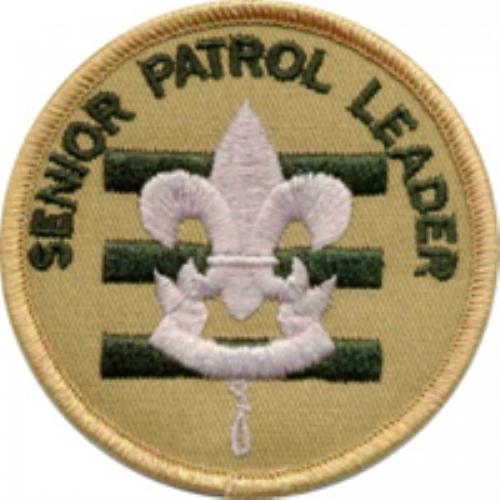
Senior Patrol Leader
|
The Senior Patrol Leader is the top youth leader in the troop. He is elected by the scouts in the troop. The description below represents the expectations for this position in our troop. Specifics can vary from one troop to another.
The Senior Patrol Leader is elected by the scouts to represent them as the top youth leader in the troop.
Qualifications:
- First Class rank or higher
- Must be approved by the Scoutmaster
- Elected by the youth members of the troop
- May not serve two consecutive terms (Exception: May run for a consecutive term if there are only one or zero candidates)
Reports to: Scoutmaster
Senior Patrol Leader duties:
- Preside at all troop meetings and activities. Attendance expectation 80%
- Chair the monthly Patrol Leaders’ Council (PLC). Attendance expectation 80%
- Participate in outings. Attendance expectation 65%
- Appoint Assistant Senior Patrol Leader (ASPL) with the advice and consent of the Scoutmaster.
- Assign specific duties to other youth leaders.
- Assist the Scoutmaster in training youth leaders.
- Delegate tasks to the ASPL. Make sure ASPL attends any meeting/function he will not be able to attend.
- Oversee the planning efforts of scouts for all troop events.
- Set a good example.
- Wear the field uniform (class A) correctly to all regular troop meetings and religious services.
- Wear the activity uniform (class B t-shirt) to all outings and other troop activities.
- Live by the Scout Oath and Law.
- Show Scout spirit.
|
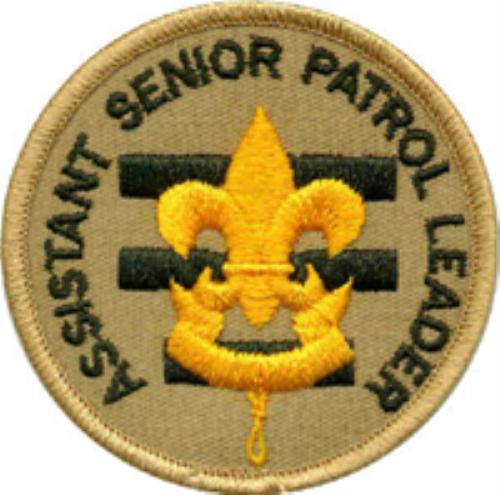
Assistant Senior Patrol Leader
|
The Assistant Senior Patrol Leader is the second highest-ranking youth leader in the troop. He is appointed by the Senior Patrol Leader with the approval of the Scoutmaster.
The Assistant Senior Patrol Leader acts as the Senior Patrol Leader in the absence of the Senior Patrol Leader or when called upon. He also provides direction to other youth leaders in the Troop.
Assistant Senior Patrol Leader
Qualifications:
- Appointed by SPL with Scoutmaster approval
- First Class Rank or higher
- May not serve two consecutive terms
Reports to: Senior Patrol Leader
Assistant Senior Patrol Leader duties:
- Help with leading meetings and activities as called upon by the Senior Patrol Leader.
- Take over troop leadership in the absence of the Senior Patrol Leader.
- Be responsible for training and giving direction to the following youth leaders: Scribe, Librarian, Historian, Quartermaster, Webmaster, Leave Not Trace Trainer, and Chaplain Aide.
- Perform tasks assigned by the Senior Patrol Leader.
- Serve as a member of the Patrol Leaders’ Council. Attendance expectation 65%
- Participate in outings. Attendance expectation 65%
- Attend troop meetings. Attendance expectation 65%
- Set a good example.
- Wear the field uniform (class A) correctly to all regular troop meetings and religious services.
- Wear the activity uniform (class B t-shirt) to all outings and other troop activities.
- Live by the Scout Oath and Law.
- Show Scout spirit.
|
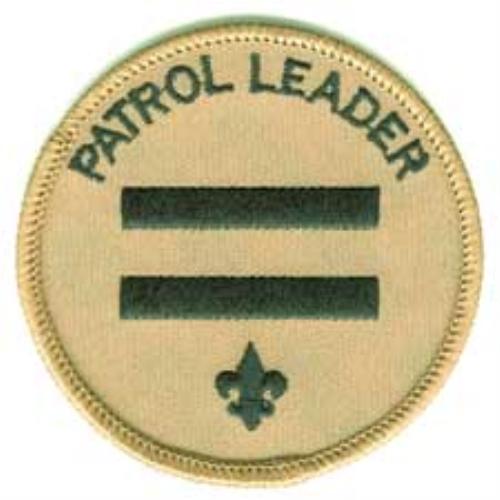
Patrol Leader
|
A Patrol Leader is elected by his patrol. He is essential for implementing the patrol method within the Troop. He guide his patrol, receives input from them, and represents them in the Patrol Leaders Council (PLC). The position description below is a sample. Modify it to fit the needs of your troop.
Patrol Leader
Qualifications:
- Second Class rank or higher (Exception: There is no rank requirement for the Patrol Leader for a new scout patrol)
- Must be approved by the Scoutmaster
- Elected by the members of the patrol
- May not serve two consecutive terms (Exception: May run for a consecutive term if there are only one or zero candidates)
Reports to: The Senior Patrol Leader
Patrol Leader duties:
- Plan and lead patrol meetings and activities.
- Keep patrol members informed.
- Create a duty roster for each camping trip.
- Help patrol members succeed in their assigned duties
- Represent the patrol at all Patrol Leaders’ Council (PLC) meetings. Attendance expectation 65%
- Make sure Assistant Patrol Leader attends any meeting/activity he will not be able to attend.
- Prepares the patrol to take part in all troop activities.
- Develop patrol spirit.
- Participate in outings. Attendance expectation 65%
- Attend troop meetings. Attendance expectation 65%
- Work with other troop leaders to make the troop run well.
- Know what patrol members and other leaders can do.
- Set a good example.
- Wear the field uniform (class A) correctly to all regular troop meetings and religious services.
- Wear the activity uniform (class B t-shirt) to all outings and other troop activities.
- Live by the Scout Oath and Law.
- Show Scout spirit.
|
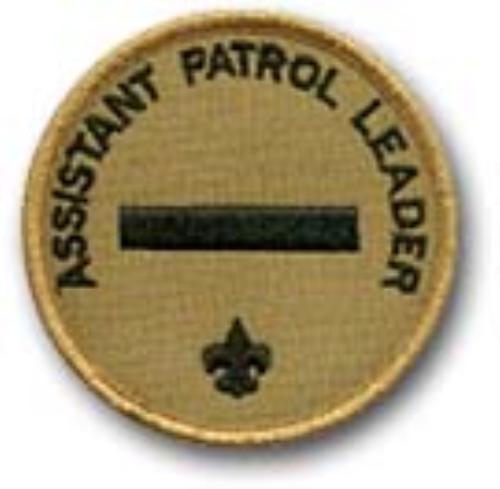
Assistant Patrol Leader
|
The Assistant Patrol Leader is a youth member of a Boy Scout troop who is appointed by the Patrol Leader and leads the patrol in his absence. The position of Assistant Patrol Leader does not qualify for the leadership requirements for advancement. (See the leadership positions listed in the Star, Life, and Eagle requirements in the Boy Scout handbook.)
Assistant Patrol Leader
Qualifications:
- Appointed by the Patrol Leader with Scoutmaster approval
- Tenderfoot Rank or higher (Exception: There is no rank requirement for the Assistant Patrol Leader for a new scout patrol)
- May not serve two consecutive terms
Reports to: The Patrol Leader
Trained by: Assistant Senior Patrol Leader with assistance from the Assistant Scoutmaster for Older Scouts (or by the Troop Guide and Assistant Scoutmaster for New Scouts if this is a new scout patrol)
Assistant Patrol Leader duties:
- Assist the Patrol Leader in planning and leading patrol meetings and activities
- Helps the Patrol Leader keep patrol members informed.
- Assists the Patrol Leader in preparing the patrol to take part in all troop activities.
- Arrive 5 minutes before the start of troop meetings.
- Direct the patrol at meetings and activities
- Take charge of the patrol in the absence of the Patrol Leader.
- Represent the patrol at Patrol Leaders’ Council (PLC) meetings in the absence of the Patrol Leader.
- Work with the other troop leaders to make the troop run well.
- Participate in outings. Attendance expectation 65%
- Attend troop meetings. Attendance expectation 65%
- Help develop patrol spirit.
- Set a good example.
- Wear the field uniform (class A) correctly to all regular troop meetings and religious services.
- Wear the activity uniform (class B t-shirt) to all outings and other troop activities.
- Live by the Scout Oath and Law.
- Show Scout Spirit.
|
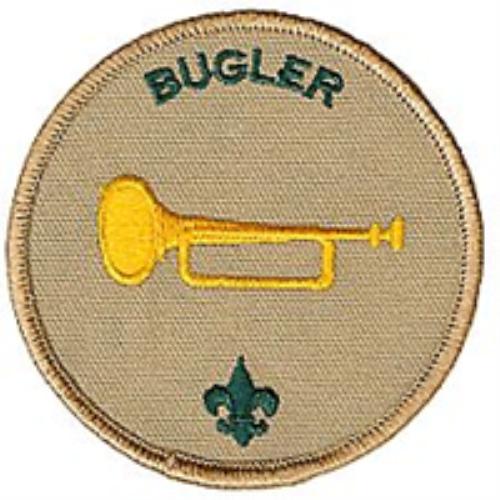
Bugler
|
The Bugler plays the bugle at troop ceremonies. Bugler is one of those positions that many troops don’t fill. There was a troop next to us at the last camporee with a Bugler, and there is something really nice about hearing Taps played at lights out. Bugler can be used as a position of responsibility for the ranks of Star or Life, but not for the rank of Eagle.
Bugler
Qualifications:
- Appointed by Senior Patrol Leader and Assistant Senior Patrol Leader with Scoutmaster approval
- Tenderfoot Rank or higher
- May not serve three consecutive terms
Reports to: The Assistant Senior Patrol Leader
Trained by: Assistant Senior Patrol Leader with assistance from the Assistant Scoutmaster for Older Scouts
Bugler duties:
- Play bugle as requested by troop leadership.
- Play taps during evening closing ceremony.
- Practice bugling daily until proficient.
- Arrive 5 minutes before the start of troop meetings.
- Participate in outings. Attendance expectation 50%
- Attend troop meetings. Attendance expectation 50%
- Set a good example.
- Wear the field uniform (class A) correctly to all regular troop meetings and religious services.
- Wear the activity uniform (class B t-shirt) to all outings and other troop activities.
- Live by the Scout Oath and Law
- Show scout spirit.
|
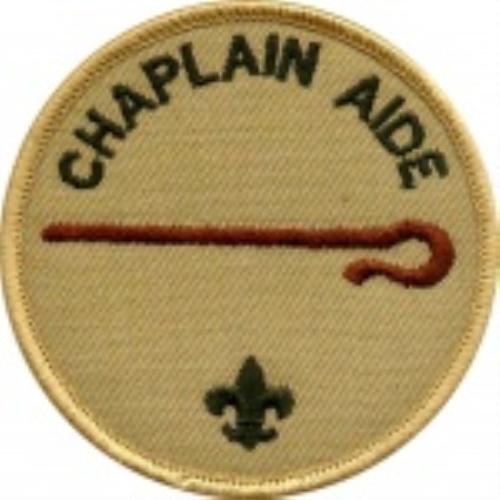
Chaplain Aide
|
“A Scout is reverent.”
The twelfth point of the Scout Law indicates that Duty to God should be an important part of the Scouting program. Having the right Scout in the Chaplain Aide position can help integrate religious activities into a troop program. The Chaplain Aide works with the Troop Chaplain to meet the religious needs of the Scouts in the troop and to promote religious emblems programs.
If your troop has Scouts from different faiths, make sure your Chaplain Aide is sensitive to the varying needs of the unit.
Chaplain Aide
Qualifications:
- Appointed by SPL and ASPL with Scoutmaster approval
- Tenderfoot Rank or higher
- May not serve three consecutive terms
Reports to: the Assistant Senior Patrol Leader
Chaplain Aide duties:
- Keep troop leader apprised of religious holidays when planning activities.
- Assists the campmaster for each outing in planning participation in religious services.
- Encourage saying grace at meals while camping or on activities.
- Lead the troop in prayer at troop meetings and other troop activities.
- Promotes participation in religious emblem programs.
- Participate in outings. Attendance expectation 50%
- Attend troop meetings. Attendance expectation 50%
- Set a good example.
- Wear the field uniform (class A) correctly to all regular troop meetings and religious services.
- Wear the activity uniform (class B t-shirt) to all outings and other troop activities.
- Live by the Scout Oath and Law.
- Show Scout spirit.
|
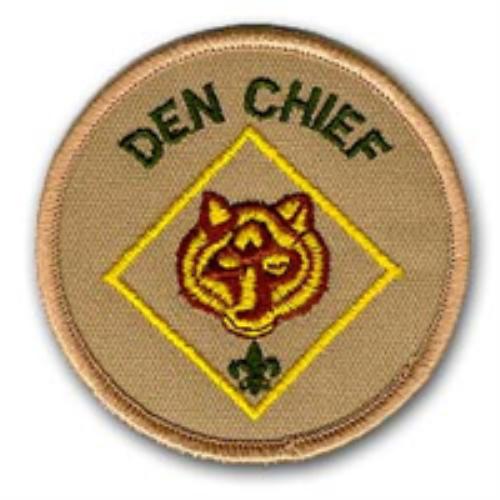
Den Chief
|
The Den Chief is a Boy Scout who works with the Cub Scouts, Webelos Scouts, and den leaders in the Cub Scout pack. They can lead games, participate in discussions, help with Scout skills, and more. They provide a link to Boy Scouts. When your Webelos cross over to the troop, they will feel like they already have a friend there.
When matching up den chiefs to dens, we always take age into consideration. A den chief should be several years older than the Cub Scouts he is working with. If you have a younger Scout who wants to be a den chief, put him with a young den. Webelos would be better off with a teenager as a den chief.
The description and requirements below are an example. Adjust them as necessary to meet the needs of your troop. The printable copy also includes a self evaluation form for the position.
Qualifications:
- Appointed by Scoutmaster
- Second Class Rank or higher
Reports to: The Den Leader in the pack and the Assistant Scoutmaster for the New Scout Patrol in the troop.
Den Chief duties:
- Serve as the activities assistant at den meetings.
- Communicate regularly with the Den Leader to review the den and pack meeting plans.
- If serving as a Webelos Den Chief, prepare boys to join Boy Scouting.
- Project a positive image of Boy Scouting.
- Know the purposes of Cub Scouting.
- Encourage Cub Scouts to join a Boy Scout troop upon graduation.
- Help out at monthly pack meetings.
- Attends at least 2/3 of the den meetings/events during his service period.
- Be a friend to the boys in the den.
- Participate in outings. Attendance expectation 50%
- Attend troop meetings. Attendance expectation 50%
- Set a good example.
- Wear the field uniform (class A) correctly to all regular troop meetings, religious services, and den meetings.
- Wear the activity uniform (class B t-shirt) to all outings and other troop activities.
- Live by Scout Oath and Law.
- Show scout Spirit.
|
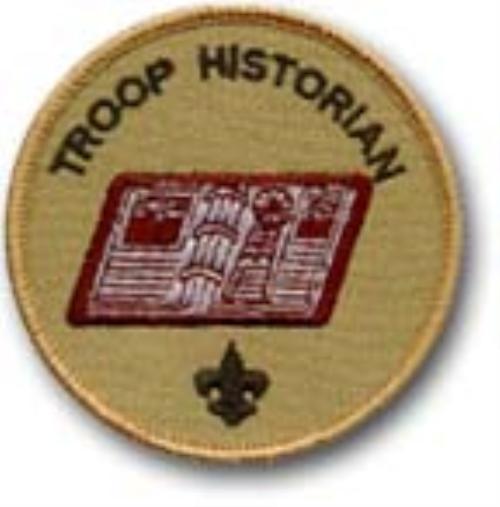
Historian
|
The Troop Historian records troop activities. This job is perfect for a Scout who likes to take pictures and write journal entries.
Qualifications:
- Appointed by Senior Patrol Leader and Assistant Senior Patrol Leader with Scoutmaster approval
- Tenderfoot Rank or higher
- May not serve three consecutive terms
Reports to: The Assistant Senior Patrol Leader
Trained by: Assistant Senior Patrol Leader with assistance from the Assistant Scoutmaster for Older Scouts
Historian duties:
- Keep a journal of all Troop events for historical purposes.
- Includes in journal reports of each outing or activity.
- Includes in journal entries the place and time of the event, a few paragraphs about the event, and a list of attendees.
- Document journal entries with photographs and maps when possible.
- Bring journal to each Court of Honor so that Troop members may review it.
- Arrive 5 minutes before the start of troop meetings.
- Participate in outings. Attendance expectation 80%
- Attend troop meetings. Attendance expectation 30%
- Wear the field uniform (class A) correctly to all regular troop meetings and religious services.
- Wear the activity uniform (class B t-shirt) to all outings and other troop activities.
- Live by the Scout Oath and Law
- Set a good example.
- Show scout spirit.
|
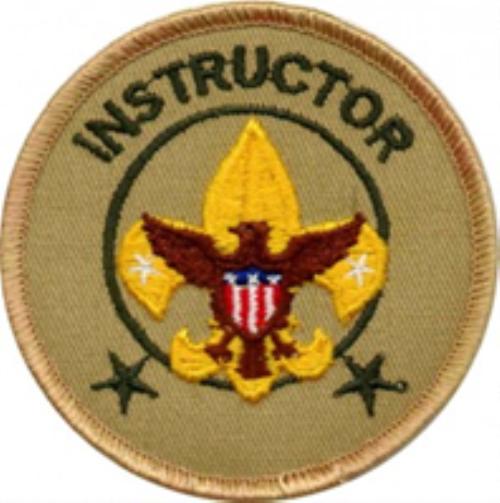
Instructor
|
Instructor is a very important position in a troop. Scouts working toward the ranks of Tenderfoot, Second Class, and First Class need to learn a lot of skills. The instructor helps them learn and demonstrate the skills. He enlists the help of other experienced Scouts from the troop to help him.
The description and requirements below are an example. Adjust them as necessary to meet the needs of your troop. The printable copy also includes a self evaluation form for the position.
Printable copy of Instructor Description and Self Evaluation
Instructor
The Instructor teaches scout skills.
Qualifications:
- Appointed by SPL with Scoutmaster approval
- First Class Rank or higher
- May not serve three consecutive terms
Reports to: The Assistant Scoutmaster
Instructor duties:
- Instruct Scout skills as needed within the troop or patrols.
- Prepare well in advance for each teaching assignment.
- Be proficient in all Scouting skills from Tenderfoot through First Class.
- Work with Troop Guide in advancing new scouts.
- Conduct Totin’ Chip, Firem’n Chit, Safe Swim Defense, and Safety Afloat instruction on campouts as needed.
- Participate in outings. Attendance expectation 65%
- Attend troop meetings. Attendance expectation 65%
- Set a good example.
- Wear the field uniform (class A) correctly to all regular troop meetings and religious services.
- Wear the activity uniform (class B t-shirt) to all outings and other troop activities.
- Live by the Scout Oath and Law.
- Show Scout spirit.
|
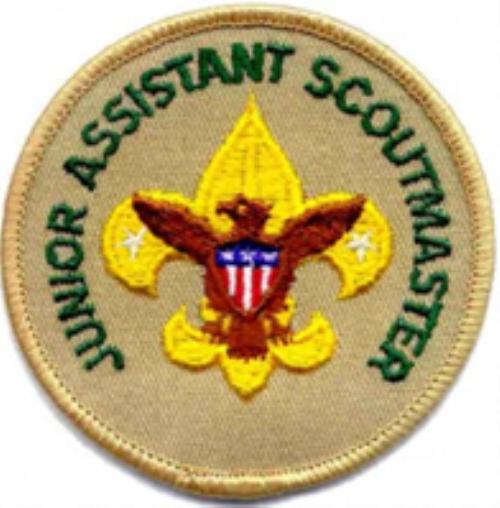
Junior Assistant Scoutmaster
|
The Junior Assistant Scoutmaster is a youth member of a Boy Scout troop who serves in the capacity of an Assistant Scoutmaster except where legal age and maturity are required. He must be at least 16 years old and not yet 18. He is appointed by the Scoutmaster because of his demonstrated leadership ability.
Junior Assistant Scoutmaster
Qualifications:
- Appointed by Scoutmaster
- At least 16 years old
- Eagle Scout
Reports to: Scoutmaster
Trained by: Scoutmaster
Junior Assistant Scoutmaster Duties:
- Function as an Assistant Scoutmaster (except for leadership responsibilities reserved for adults 18 years of age or older).
- Accomplish any duties assigned by the Scoutmaster.
- Arrive 5 minutes before the start of troop meetings.
- Participate in outings, service projects, events, etc. Attendance expectation 50%
- Attend troop meetings. Attendance expectation 50%
- Set a good example.
- Wear the field uniform (class A) correctly to all regular troop meetings and religious services.
- Wear the activity uniform (class B t-shirt) to all outings and other troop activities.
- Live by the Scout Oath and Law.
- Show Scout spirit.
|
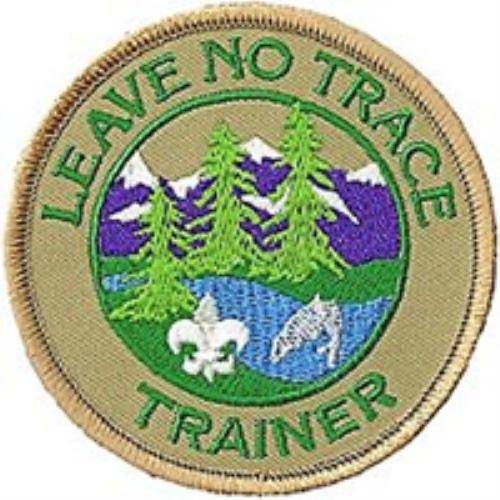
Leave No Trace Trainer
|
In 2010, BSA added two more Boy Scout youth leadership positions – Leave No Trace Trainer and Webmaster. The Leave No Trace Trainer is a youth member of the troop who ensures that Leave No Trace principles are followed on all troop outings and activities.
Leave No Trace Trainer
Qualifications:
- Appointed by Senior Patrol Leader and Assistant Senior Patrol Leader with Scoutmaster approval
- Tenderfoot Rank or higher
- May not serve three consecutive terms
Reports to: the Assistant Senior Patrol Leader
Trained by: Assistant Senior Patrol Leader with assistance from the Assistant Scoutmaster for Older Scouts
Leave No Trace Trainer duties:
- Know by heart the Leave No Trace principles and be able to explain them in detail to others.
- Instruct the troop about Leave No Trace principles before outings.
- While on outings, ensure that Leave No Trace principles are followed, providing direction and instruction as necessary.
- Arrive 5 minutes before the start of troop meetings.
- Participate in outings. Attendance expectation 80%
- Attend troop meetings. Attendance expectation 30%
- Set a good example.
- Wear the field uniform (class A) correctly to all regular troop meetings and religious services.
- Wear the activity uniform (class B t-shirt) to all outings and other troop activities.
- Live by the Scout Oath and Law.
- Show Scout spirit.
|
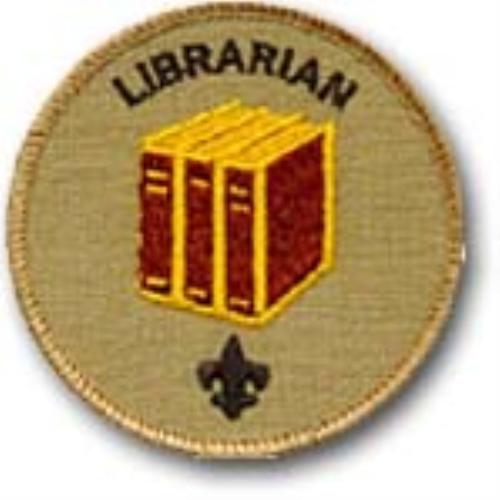
Librarian
|
Most Boy Scout troops keep a library of merit badge pamphlets and other resources. The Librarian is a youth member of the troop who takes care of this troop literature.
Librarian
Qualifications:
- Appointed by Senior Patrol Leader and Assistant Senior Patrol Leader with Scoutmaster approval
- Tenderfoot Rank or higher
- May not serve three consecutive terms
Reports to: The Assistant Senior Patrol Leader
Trained by: Assistant Senior Patrol Leader with assistance from the Assistant Scoutmaster for Older Scouts
Librarian duties:
- Keep records on literature owned by the troop.
- Add new or replacement items as needed.
- Keep books and pamphlets available for borrowing at troop meetings.
- Keep a system for checking books and pamphlets in and out.
- Follow up on late returns.
- Arrive 5 minutes before the start of troop meetings.
- Participate in outings. Attendance expectation 30%
- Attend troop meetings. Attendance expectation 80%
- Set a good example.
- Wear the field uniform (class A) correctly to all regular troop meetings and religious services.
- Wear the activity uniform (class B t-shirt) to all outings and other troop activities.
- Live by the Scout Oath and Law
- Show scout spirit.
|
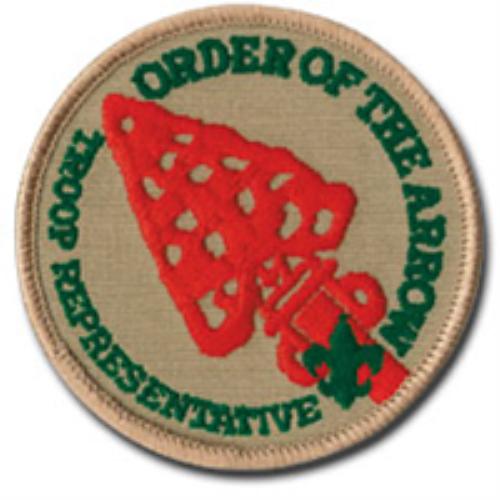
O/A Representative
|
The Order of the Arrow is Scouting’s national honor society. OA members are dedicated to the ideal of “cheerful service”. They also encourage other Scouts to participate in camping events.
An Order of the Arrow Troop Representative is a youth liaison between the local OA lodge or chapter and his troop. In his troop, he serves the Arrowman as well as adult leaders and Scouts who are not OA members. He encourages Arrowmen to participate in lodge and chapter events. He also works to strengthen the troop’s camping program.
OA Troop Representative
Qualifications:
- Appointed by Senior Patrol Leader and Assistant Senior Patrol Leader with Scoutmaster approval
- OA Member in good standing
- May not serve three consecutive terms
Reports to: The Assistant Senior Patrol Leader
Trained by: Assistant Senior Patrol Leader with assistance from the Assistant Scoutmaster for Older Scouts
OA Troop Representative duties:
- Serves as a communication link between the lodge or chapter and the troop.
- Encourages participation in monthly camping outings.
- Encourages participation in summer camp.
- Encourages older Scout participation in high adventure programs.
- Encourages Scouts to actively participate in community service projects.
- Encourages Arrowmen to assume leadership positions in the troop.
- Encourages Arrowmen in the troop to be active participants in the lodge and/or chapter activities and to seal their membership in the Order by becoming Brotherhood members.
- Participate in outings. Attendance expectation 80%
- Attend troop meetings. Attendance expectation 50%
- Sets a good example.
- Wear the field uniform (class A) correctly to all regular troop meetings and religious services.
- Wear the activity uniform (class B t-shirt) to all outings and other troop activities.
- Lives by the Scout Oath, Scout Law and OA Obligation .
- Shows Scout spirit
|
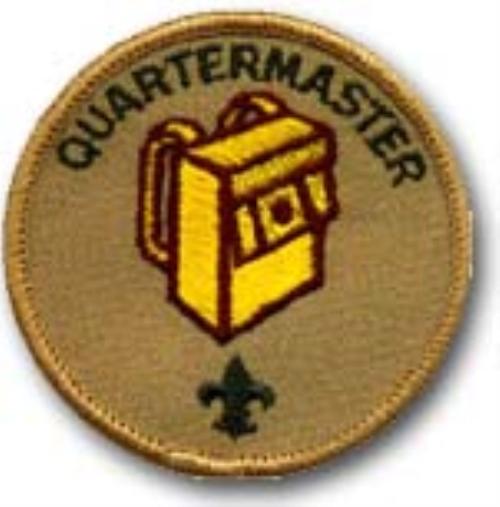
Quartermaster
|
Camping is an integral part of the Boy Scout program and most troops have a good amount of camping gear to maintain. The Quartermaster is a youth member of the troop who keeps track of troop equipment and sees that it is in good working order.
Quartermaster
Qualifications:
- Appointed by Senior Patrol Leader and Assistant Senior Patrol Leader with Scoutmaster approval
- Tenderfoot rank or higher
- May not serve three consecutive terms
Reports to: The Assistant Senior Patrol Leader
Trained by: Assistant Senior Patrol Leader with assistance from the Assistant Scoutmaster for Older Scouts
Troop Quartermaster duties:
- Update troop equipment inventory quarterly.
- Keep equipment in good repair.
- Issue equipment and see that it is returned in good order.
- Suggest new or replacement items.
- Participate in outings. Attendance expectation 80%
- Attend troop meetings. Attendance expectation 50%
- Set a good example.
- Wear the field uniform (class A) correctly to all regular troop meetings and religious services.
- Wear the activity uniform (class B t-shirt) to all outings and other troop activities.
- Live by the Scout Oath and Law.
- Show Scout spirit.
|
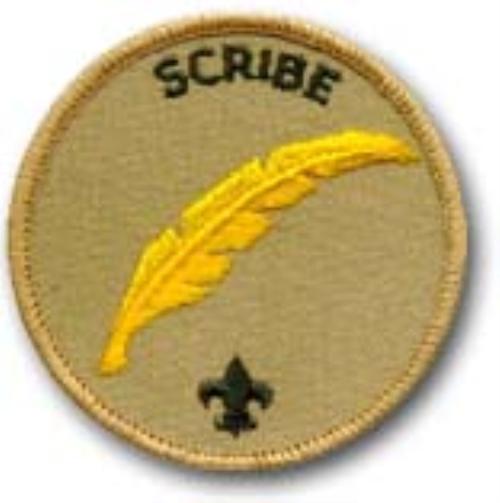
Scribe
|
Almost every organization needs somebody to keep records. A Boy Scout troop is no exception. The Scribe is a youth member of the troop who records the minutes of the Patrol Leaders’ Council (PLC) and works with the Troop Committee Secretary and Advancement Chair.
Scribe
Qualifications:
- Appointed by Senior Patrol Leader and Assistant Senior Patrol Leader with Scoutmaster approval
- Tenderfoot Rank or higher
- May not serve three consecutive terms
Reports to: The Assistant Senior Patrol Leader
Trained by: Assistant Senior Patrol Leader with assistance from the Assistant Scoutmaster for Older Scouts
Troop Scribe duties:
- Attend and take minutes of Patrol Leaders’ Council (PLC). Attendance expectation 80%
- Arrive 5 minutes before the start of troop and PLC meetings.
- Distribute copies of PLC minutes to PLC members and adult leaders in a timely manner.
- Record attendance at all troop meetings, outings, and other activities.
- Record advancement on troop advancement chart.
- Share records with the troop committee secretary and advancement chair.
- Participate in outings. Attendance expectation 50%
- Attend troop meetings. Attendance expectation 80%
- Set a good example.
- Wear the field uniform (class A) correctly to all regular troop meetings and religious services.
- Wear the activity uniform (class B t-shirt) to all outings and other troop activities.
- Live by the Scout Oath and Law.
- Show Scout spirit.
|
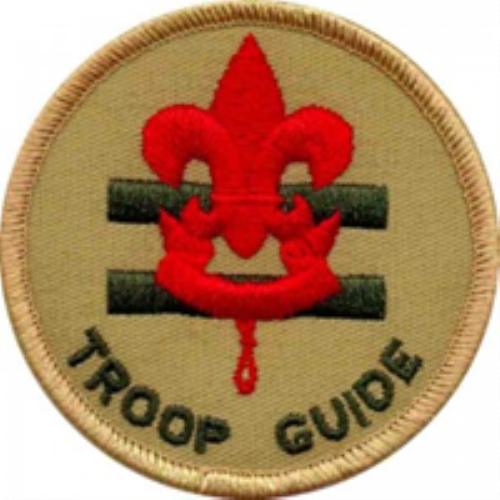
Troop Guide
|
Troop Guide is another important youth leadership position in a Boy Scout troop. A troop guide is an older scout who helps new scouts learn the “Boy Scout way” of doing things, which is much different from the “Cub Scout way” of doing things.
Any older Scout who is good with younger members of the troop is a good candidate for Troop Guide. If you have a den crossing over to your troop, then a very natural thing is to let the Boy Scout who was their Den Chief when they were Cub Scouts become their Troop Guide.
Troop Guide
The Troop Guide introduces new scouts to troop operations and helps them feel comfortable in the troop.
Qualifications:
- Appointed by Senior Patrol Leader with Scoutmaster approval
- First Class Rank or higher
- May not serve three consecutive terms
Reports to: The Assistant Scoutmaster for New Scouts Trained By: The Assistant Scoutmaster for New Scouts with the Assistant Senior Patrol Leader
Troop Guide duties:
- Help new scouts earn advancement requirements through First Class.
- Attend Patrol Leaders Council (PLC) to present plan for upcoming skill instruction. Attendance expectation 80%
- Arrive 5 minutes before the start of troop meetings.
- Prevent harassment of new scouts by older scouts.
- Help older scouts teach skills to new scouts with the guidance of the Assistant Scoutmaster for New Scouts.
- Train the Patrol Leader and Assistant Patrol Leader of the New Scout Patrol.
- Guide new scouts through early troop experiences to help them become comfortable in the troop and the outdoors.
- Teach basic scout skills.
- Participate in outings. Attendance expectation 65%
- Attend troop meetings. Attendance expectation 80%
- Set a good example.
- Wear the field uniform (class A) correctly to all regular troop meetings and religious services.
- Wear the activity uniform (class B t-shirt) to all outings and other troop activities.
- Live by the Scout Oath and Law.
- Show Scout spirit.
|
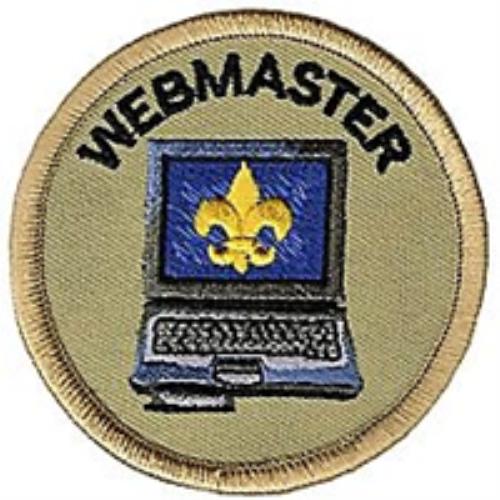
Troop Webmaster
|
The Webmaster posts information about troop outings, service projects, and other events to the troop and/or chartered organization website.
Webmaster
Qualifications:
- Appointed by Senior Patrol Leader and Assistant Senior Patrol Leader with Scoutmaster approval
- Tenderfoot Rank or higher
- May not serve three consecutive terms
Reports to: the Assistant Senior Patrol Leader
Trained by: Assistant Senior Patrol Leader with assistance from the Assistant Scoutmaster for Older Scouts
Webmaster duties:
- Ensures that all event dates and times are listed correctly on the troop and/or chartered organization website.
- Obtains information about outings, service projects, and other troop events from the Historian.
- Posts a news article about each troop outing and service project on the troop and/or chartered organization website. Articles must be posted within two weeks of the event.
- Posts photos of troop events and service projects on the troop and/or chartered organization website.
- Arrive 5 minutes before the start of troop meetings.
- Participate in outings. Attendance expectation 50%
- Attend troop meetings. Attendance expectation 50%
- Set a good example.
- Wear the field uniform (class A) correctly to all regular troop meetings and religious services.
- Wear the activity uniform (class B t-shirt) to all outings and other troop activities.
- Live by the Scout Oath and Law.
- Show Scout spirit.
|
|
|
 |
 |
|
 |
 |
 |
 |
|
|
|
|
|
|
|
|
|